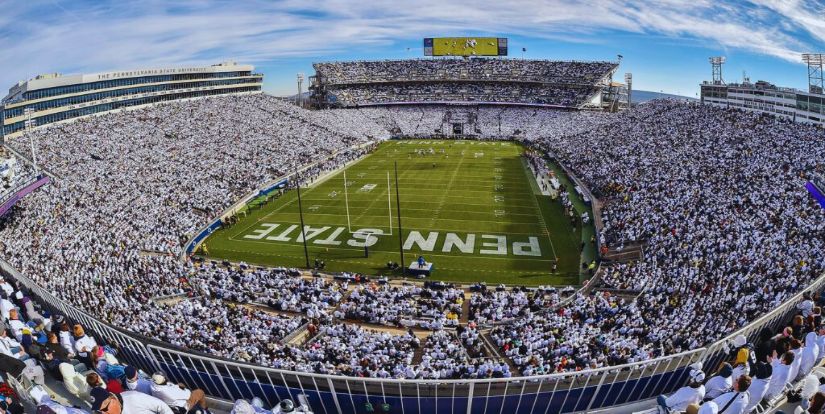State College, Pennsylvania – Penn State University has unveiled ambitious plans for a $700 million renovation of its beloved Beaver Stadium, with a joint venture comprising Barton Malow, AECOM Hunt, and Alexander Building Construction Co. at the helm of this extensive project.
The renowned Kansas City-based architectural firm Populous will lend its design expertise to transform the stadium into a state-of-the-art facility while preserving its rich history.
The Journey Begins
The much-anticipated renovation project, set to kick off in January 2025, promises an exciting transformation for Penn State and college football enthusiasts. This endeavor marks a major milestone in the stadium’s illustrious history, which has been the home of the Nittany Lions since 1960.
Over the years, Beaver Stadium has undergone six expansions, culminating in its current capacity of 106,572. It’s now the second-largest stadium in the country, surpassed only by the University of Michigan’s facility in Ann Arbor, and ranks as the fourth largest in the world, according to StateCollege.com.
A Winning Partnership
The joint venture, spearheaded by Barton Malow, AECOM Hunt, and Alexander Building Construction Co., brings together three industry giants with unique expertise. This powerful alliance aims to revamp Beaver Stadium into a modern sports facility while preserving its cherished traditions.
The project will focus on revitalizing the stadium’s west side, maintaining the iconic bowl-style seating arrangement, and introducing exciting new additions, including club and lodge seats and suites.
Also Read, RAAC – Reinforced Autoclaved Aerated Concrete in Educational Institutions in Wales
Beyond the Seating Arrangements
The renovation goes beyond enhancing the seating experience. It includes several critical improvements, such as circulation enhancements, restroom upgrades, expanded concessions, Wi-Fi accessibility, and other ongoing code improvements.
The ultimate goal is to create a more comfortable, accessible, and enjoyable environment for fans and athletes alike.
The Path to Completion
Fans won’t have to wait too long to experience the revamped Beaver Stadium. The project team is optimistic about completing the renovations before the 2027 football season, promising an exciting future for Penn State’s football program.
Battling the Elements
One of the remarkable features of the Beaver Stadium renovation is the introduction of winterization measures. These measures, including pipe insulation, will allow the Penn State football team to host more games even when temperatures dip below freezing.
This is a significant step towards expanding the football program’s capacity and ensuring fans can enjoy their beloved sport in any weather.
A Touch of Nostalgia
The design for the new Beaver Stadium comes from the esteemed architectural firm Populous, which boasts a special connection to Penn State.
Scott Radecic, Populous’s senior principal and founder, is a Penn State alumni and former football team captain. His connection to the university adds more significance to this monumental project.
Funding the Future
Importantly, the Penn State Board of Trustees’ decision to approve this grand renovation project in May ensures that it will utilize only tuition dollars and educational budget funds.
Instead, construction will be funded solely through intercollegiate athletics funds. This decision underscores the university’s commitment to its academic and athletic programs.
Also Read, IEW Construction Plays a Key Role in Building and Repairing New Jersey’s Infrastructure
A Growing Trend
Penn State’s Beaver Stadium renovation project joins a growing trend in college sports. Several colleges and universities across the United States, including Kansas, Florida, West Point, and Fresno State, also invest heavily in upgrading their sports facilities.
The University of Nebraska Cornhuskers Memorial Stadium in Lincoln is undergoing a $450 million makeover to enhance the game day experience, making it the most expensive construction project in the school’s history.
On the other hand, the University of Central Florida is seeking tourism taxes to fund improvements to its athletic facilities, including FBC Mortgage Stadium, Additional Financial Arena, and the Venue.
The future of college sports facilities is looking brighter than ever, and Penn State’s Beaver Stadium is set to lead the way with its ambitious and transformative renovation. With a rich history and an exciting future, this project will undoubtedly leave a lasting impact on college football.











